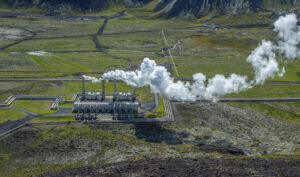
Effective as of 13.10.2023, amendments and additions to the Renewable Energy Sources Act (RESA) and several other laws were promulgated in the Bulgarian State Gazette, which aim to develop the prospecting, exploration and use of geothermal energy. A small part of the amendment package is contained in the RESA, mainly definitions. The bulk of the amendments are concentrated in the Underground Resources Act (URA), the Water Act (WA), and the Spatial Planning Act (SPA).
The new legal framework will be presented in more detail below in the presentation, but for a proper understanding of it, brief terminological notes, an introduction to the basic principle of sustainable use of geothermal energy and a general description of the legal framework before the changes are necessary to be made.
Legal terms
According to the legal definition in the RESA, ‘geothermal energy’ is energy derived from naturally heated vapours, liquids or geological formations on the surface or underground, which are continuously recovered by natural processes and represents a flow of heat from the earth’s subsurface (§ 1, item 43 of the Supplementary Provisions of the RESA). Sources of geothermal energy are grouped together under the name ‘geothermal resources’ and have a legal definition, generally defined as a concentration of heat in surface and/or subsurface naturally heated vapours, fluids or geological formations (§ 1, item 67 of the Supplementary Provisions of the RESA).
Geothermal resources are mainly classified as shallow and deep, and our legislation adopts the approach in French legislation and introduces the distinction according to the depth from which they are extracted. Thus, in our country, shallow geothermal resources are those located at depths of up to 200 meters below the ground surface. Deep geothermal resources are those located at depths of more than 200 meters below the earth’s surface and, in view of the geological features of the territory of the Republic of Bulgaria, can reach depths of up to 6 000 meters. To protect and sustainably use water, the term ‘hydrogeothermal resources’ has been introduced, which brings together geothermal resources contained in water resources within the meaning of the Water Act. Hydrogeothermal resources can be both shallow and deep.
A key principle for the sustainable use of geothermal energy
The guiding principle underlying the regulatory changes is the minimum disturbance of geothermal resources in the process of geothermal energy extraction. The law encourages the use primarily of closed geothermal systems, where only the heat of the geological formation (e.g., rocks) or water body is extracted without water abstraction. Cheaper technologies with water abstraction are also acceptable, but in these cases only removing temperature from the water and returning it to the water body is encouraged. The manifestation of this principle in the new legislation will be presented later in the presentation.
A brief description of the pre-amendment legislation
Until recently, the existing legal framework lacked adequate mechanisms to exploit the country’s geothermal potential. The implementation of projects for the use of shallow geothermal resources in buildings of public importance (e.g. for heating kindergartens, medical institutions, etc.) under the old legislation was carried out after a lengthy and complex coordination regime (as evidenced by the small number of projects implemented). At the same time, the use of geothermal energy by domestic customers for heating residential and villa buildings was carried out practically uncontrolled disregarding the principle described above. The use of deep geothermal resources for industrial purposes and electricity generation was impossible.
New provisions in the legislation
Definitions
A key component of the amendment package is the definition of key terms in the geothermal sector. In addition to the concepts of “geothermal energy” and types of geothermal resources introduced above, the types of geothermal energy – low, medium and high temperature – deserve attention. Also essential is the concept of a “geothermal system”, which is a technology that extracts and uses geothermal energy for heating, cooling and/or electricity generation (§ 1, item 44 of the Supplementary Provisions of the RESA).
The regulatory framework for the development of the geothermal sector is presented below through the regimes for the use of the different types of geothermal resources.
Shallow geothermal resources
Shallow geothermal resources (extracted from depths of up to 200 meters) are suitable for supplying single and multi-family residential and public buildings with heating and cooling energy.
For the construction of geothermal systems in multi-family residential buildings and buildings of public use, a preferential regime is provided, as the approval of investment projects is not required for the issuance of a construction permit /Article 147 (1) item 8 of the Spatial Planning Act/. In cases where groundwater is not used, only a geological report shall be prepared. Where the geothermal system is intended to use groundwater (hydrogeothermal system), a hydrogeological report shall be prepared in accordance with Ordinance No 1 of 10.10.2007 on the exploration, use and protection of groundwater. In both cases, a design decision by a thermal engineer with drawings, schemes, calculations and implementation instructions shall also be prepared.
For the construction of geothermal systems (also known as air-to-ground heat pumps) in single-family residential and villa buildings, the relief is even more substantial – no construction permit is required /Article 151 (1) item 19/ of the Spatial Planning Act). These geothermal systems should not affect a depth of more than 10 meters, should be used for self-consumption only and should have an installed capacity of up to 20 kW.
Deep geothermal resources
In our country, deep geothermal resources (extracted from a depth of more than 200 meters) may be heated geological formations (e.g. rocks) or brines (waters with a high concentration of mineral elements). Deep geothermal resources are typically characterized by medium to high temperatures – in the range of 90 degrees Celsius and above. They are therefore best suited for industrial purposes and, above all, for electricity generation.
From a technological point of view, the prospecting, exploration and extraction of geothermal energy uses the same methods applied in the same operations associated with the extraction of oil and natural gas. For this reason, deep geothermal resources are regulated in the URA as a type of underground resource and the regime for their prospection, exploration and extraction is almost identical to that for oil and natural gas. In short, the procedure is as follows:
Any person to whom the grounds for exclusion do not apply and who meets the requirements under the PSA may apply for and participate in a procedure for the granting of a permit for prospecting and exploration for geothermal energy. The permit will be issued by the Minister of Energy for an initial period of up to 5 years. Upon registration of a geological discovery and obtaining a certificate of commercial discovery, the holder of the prospecting and exploration permit is granted a concession by right to extract deep geothermal resources.
There is also an additional possibility for holders of prospecting and exploration permits or concessions for the extraction of mineral resources other than geothermal resources to exploit the geothermal potential of the area they are exploring. Where, in the process of exercising the rights under the permit or concession, a deposit of deep geothermal resources is discovered, the holder is entitled to obtain a concession to extract those resources as well, in addition to its existing rights. It is important to underline that in these cases the mining concession is obtained by right, without the need for a tender or competition.
The possibility to extract rare earth elements (e.g. lithium) within the framework of the exercise of rights under a prospecting and exploration permit and/or a mining concession for deep geothermal resources has also been introduced. This has been done by including these elements in the definition of “mining waste” which rightfully belongs to the permit or concession holder.
Hydrogeothermal resources
The specifics of the hydrogeothermal resource mining regime are governed by the Water Act with its inherent objectives of sustainable, balanced and equitable water use.
Given the geological features of the territory of the Republic of Bulgaria, shallow hydrogeothermal resources are more common in the country. This is one of the main reasons for the Water Act to regulate the free use of surface and groundwater and water bodies in the case of the exploitation of shallow geothermal resources through the construction of geothermal systems. In these cases, a water abstraction permit and a water body use permit are not required.
Although less common, deep hydrogeothermal resources are also found in the country. They, like the shallow ones, do not require a water abstraction permit or a water body use permit. The difference, however, is that the parameters and requirements of the water use are contained in the prospecting and exploration permit or the mining concession issued under the Underground Resources Act. In this sense, permit holders and concessionaires, as water users, are obliged to comply with all the requirements under the Water Act /Article 48 (1) of the Water Act/.
Water injection and reinjection in cases of hydrogeothermal resource extraction (whether shallow or deep) do not require a separate permit under the Water Act. In these hypotheses, the parameters of permitted injection and reinjection include: (i) within the free use of shallow hydrogeothermal resources under art. 43 (3) of the Water Act; (ii) under the terms of the permit or concession under the URA, in cases of exploitation of deep hydrogeothermal resources.
As stated above, a key principle of the new regulations is the minimum disturbance and sustainable use of water for geothermal energy extraction. It is promoted by the amendments to the Water Act and is directly reflected in the following hypotheses under the Water Act, under which no fees are payable: a) for water abstraction under the Water Act for prospecting, exploration and extraction of deep geothermal resources, except for the quantities of water that are not returned to the water body; b) for the use of mineral waters for geothermal energy extraction – for the quantities of mineral water that are not returned to the water body.
Conclusions
Geothermal energy is one of the renewable energy sources in Bulgaria with huge potential. On the one hand, deep geothermal power plants, which have the characteristics of baseload power, produce energy without a carbon footprint in 24/7 conditions. On the other hand, the use of shallow geothermal resources through heat pumps in the residential and public sectors saves significant amounts of electricity and therefore carbon emissions.
The establishment of the new legal framework is a first step towards realizing the potential described above. It is, of course, not perfect and should undoubtedly be further developed, possibly in a separate law. Practical and technological developments will determine the timeframe for the development of regulations in this sector.
This article presents the main provisions of the new legal framework for geothermal energy and does not constitute legal advice.
For further information contact:
Aleksandar Aleksandrov, Senior Associate
aleksandar.aleksandrov@kdp-law.com









